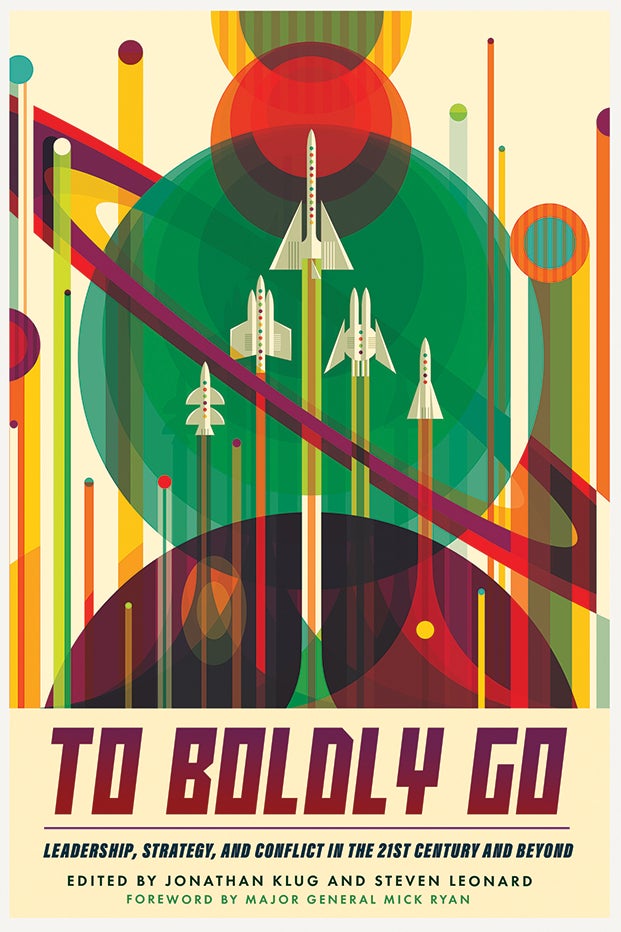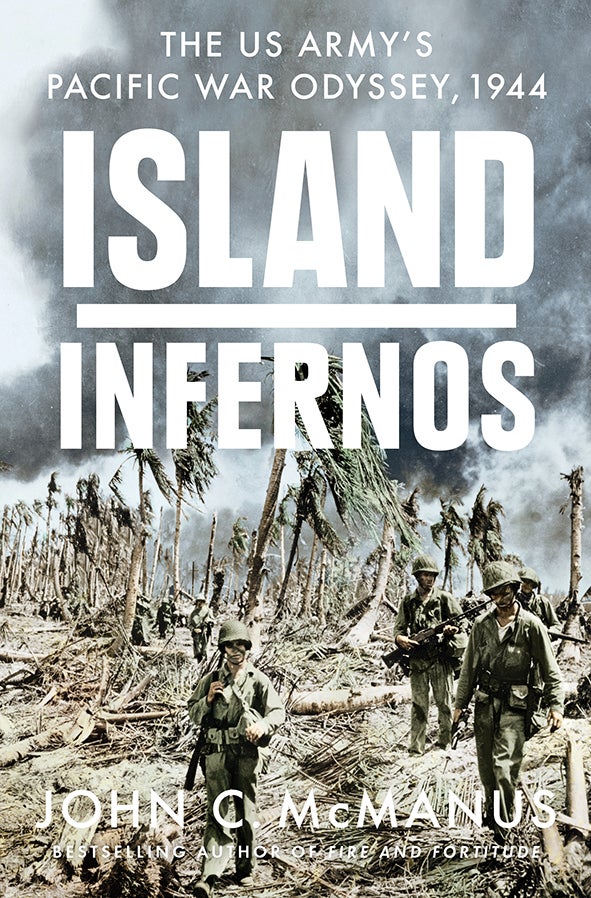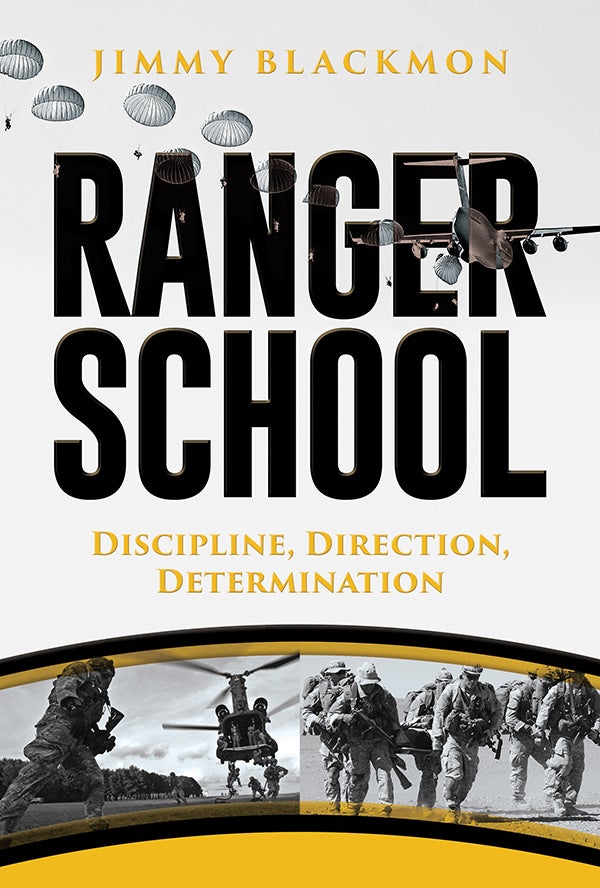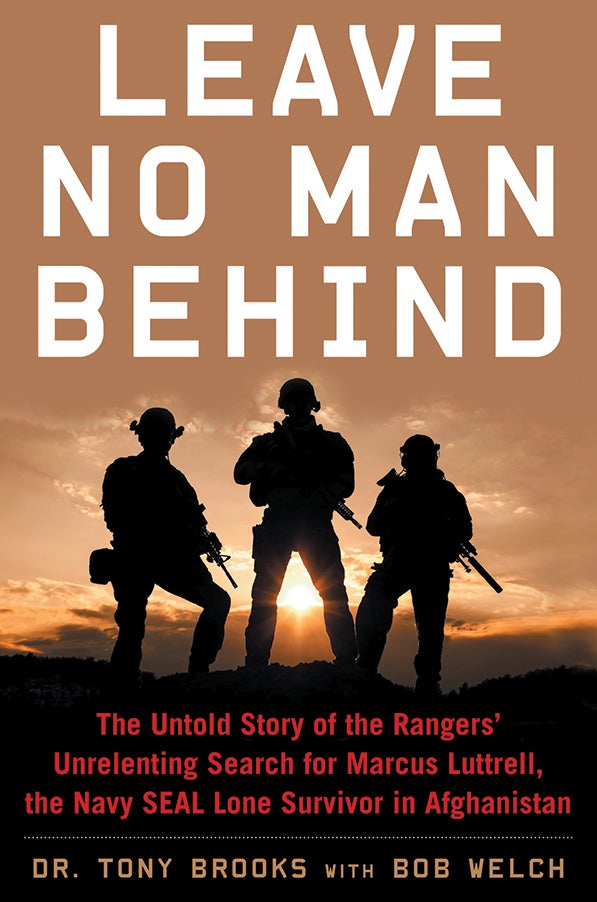January 2022 Book Reviews
January 2022 Book Reviews
Science Fiction Offers Lens to Future Wars

To Boldly Go: Leadership, Strategy, and Conflict in the 21st Century and Beyond. Edited by Jonathan Klug and Steven Leonard. Casemate Publishers. 304 pages. $34.95
By Lt. Gen. David Barno, U.S. Army retired
One of the most striking findings of the bipartisan 9/11 Commission was that the principal failure in preventing the 2001 attacks lay in “a failure of imagination.” Twenty years later, accurately envisioning the shape of conflict in the 21st century remains one of the most daunting tasks facing America’s political and military leaders—and the twin tasks of developing creative strategies and the adaptive leaders to implement them in those inevitable future clashes falls close behind.
To Boldly Go: Leadership, Strategy, and Conflict in the 21st Century and Beyond, an impressive compilation of over 30 essays, explores these challenges through the lens of science fiction, offering a fresh and creative way to grapple with them unencumbered by the confines of history or the pressures of current events.
Editors Jonathan Klug, a professor at the U.S. Army War College, and Steven Leonard, a faculty member at the University of Kansas (and best known as the creator of the satirical cartoon Doctrine Man), have given us an interesting and uniquely valuable work. Each chapter offers a thoughtful and original analysis of a noteworthy example plucked from a broad range of sci-fi movies, TV series, books and short stories.
Serious students of strategy and conflict sometimes view with ill-concealed disdain the notion that science fiction can serve as a source of critical lessons on leadership or warfighting. Yet as Australian Maj. Gen. Mick Ryan writes in the foreword, science fiction provides a “telescope to the future” to imagine what cannot be easily grasped in the world of today.
Contributor Dan Ward adds the sharp insight that good science fiction can afford us a “premortem,” a way to examine what went wrong before the future actually crashes into present-day reality.
The essays in To Boldly Go encompass topics as diverse as civil-military relations, wartime generalship and the complex webs of the military-industrial complex. The book’s many contributors span a wide range of voices from well-known science fiction writers such as Max Brooks and August Cole, to former Pentagon officials, to officers currently serving in the U.S., British and Australian militaries.
The authors navigate the reader through a series of discussions that examine well-known (and a few obscure) works of science fiction, spanning the gamut from Dune and Star Wars to Babylon 5 and even Planet of the Apes. With titles such as “You’re Not Ender Wiggins, and That’s Okay” and “Adama’s Unequal Dialogue,” even sci-fi skeptics should find their interests piqued. The results provide a rich trove of insights for anyone wrestling with the vexing issues of strategy and leadership in today’s disrupted global landscape.
To Boldly Go more than achieves its goal of producing an engaging and entertaining way to open the aperture of one’s imagination, giving a vital aimpoint on the future that helps complement the study of past conflicts. It offers a novel way to prompt fresh thinking and stretch minds consumed with today’s practical problems.
This is a book that should be read in equal measure by generals and seasoned policymakers, together with new lieutenants and graduate students. Klug and Leonard have done a great service by compiling this colorful collection of original insights on the coming wars of this century and beyond, a frontier we can only dimly perceive.
Lt. Gen. David Barno, U.S. Army retired, is a visiting professor of strategic studies at the Johns Hopkins School of Advanced International Studies, Washington, D.C., and a contributing editor and columnist at War on the Rocks. A former infantry officer and 30-year Army veteran, he served as commander of U.S. and coalition forces in Afghanistan from 2003 to 2005.
* * *
Personalities Dominate Pacific War Drama

Island Infernos: The US Army’s Pacific War Odyssey, 1944. John McManus. Dutton Caliber. 656 pages. $34
By Col. Cole Kingseed, U.S. Army retired
Island Infernos: The US Army’s Pacific War Odyssey, 1944 is the long-awaited second volume of John McManus’ trilogy of the U.S. Army in the Pacific War. Brilliantly researched and powerfully written, Island Infernos takes the reader from Kwajalein to Leyte through the critical year 1944. By combining individual soldier accounts with official records by senior officers, McManus once again establishes himself as one of the United States’ most gifted military historians.
McManus is Curators’ Distinguished Professor of U.S. military history at the Missouri University of Science and Technology. A recipient of the prestigious Gilder Lehrman Military History Prize, he has authored 14 other books on military history, including The Dead and Those About to Die: D-Day: The Big Red One at Omaha Beach; Alamo in the Ardennes: The Untold Story of the American Soldiers Who Made the Defense of Bastogne Possible; and September Hope: The American Side of a Bridge Too Far.
McManus is at his best when describing the principal actors in the Pacific War drama. Lt. Gen. Robert Eichelberger emerges as a professional, considerate and extraordinarily brilliant trainer and highly skilled I Corps commander. Sixth U.S. Army commanding general Lt. Gen. Walter Krueger exudes an “uncharismatic and brusque, even occasionally rude exterior [that] masked [a] deeply complex, thoughtful personality.” To McManus, Gen. Douglas MacArthur, the “Zeus” of the Southwest Pacific Area, is “a man of astonishing pomposity, megalomania, and egocentrism.”
Other personalities stand out in the Pacific War of 1944. Marine Lt. Gen. Holland “Howlin’ Mad” Smith, the “Father of Amphibious Warfare”; Brig. Gen. Frank Merrill of Merrill’s Marauders; and Gen. Joseph Stilwell, commanding the China-Burma-India Theater, all play critical roles in the campaigns of the Pacific Theater. McManus also accords high accolades to Lt. Gen. George Kenney of the Fifth Air Force and Lt. Col. Harold “Johnny” Johnson, a West Pointer who survived nearly 40 months of captivity and later became U.S. Army chief of staff.
The chapter on the plight of prisoners of war is particularly riveting. McManus writes: “The vicious, almost bloodthirsty behavior of Japanese soldiers in China … set the tone for Japanese actions after the outbreak of war with the Western powers. Almost immediately, when the Japanese captured some twenty thousand Americans … they treated their prisoners with shocking brutality, cruelty, and neglect.” The Bataan Death March alone claimed the lives of about 600 Americans and between 5,000 and 10,000 Filipinos.
McManus concludes the book with MacArthur’s return to the Philippines in October 1944. The subsequent conquest of Leyte proved costly, with about 18,000 American service members killed or wounded. Japanese losses at a minimum included 50,000 dead in the ground fighting for the island. In the end, neither side got what it wanted from Leyte. The Japanese intention to fight a showdown battle to reverse the tide of the war failed miserably. The Americans found few useful bases on Leyte and succeeded only in degrading the strength of Japanese combat forces.
Summarizing the hard fighting in 1944, McManus contends that “the Army in the Pacific had matured into a professionally led citizen soldier force of singular potency, flexibility, and complexity. … From Kwajalein to Leyte, the Army had unleashed hammer blows against the Japanese and, in the space of less than a year, advanced across many hundreds of miles of ocean, island, and continent to the verge of Japan’s doorstep.” Ultimate victory loomed, and that will be the subject of McManus’ concluding volume.
Col. Cole Kingseed, U.S. Army retired, a former professor of history at the U.S. Military Academy, West Point, New York, is a writer and consultant. He has a doctorate in history from Ohio State University.
* * *
Books Unlock Ranger Training, Mission


Ranger School: Discipline, Direction, Determination. Jimmy Blackmon. Knox Press. 240 pages. $27
Leave No Man Behind: The Untold Story of the Rangers’ Unrelenting Search for Marcus Luttrell, the Navy SEAL Lone Survivor in Afghanistan. Tony Brooks With Bob Welch. Diversion Books. 256 pages. $24.99.
By Col. Dominic Caraccilo, U.S. Army retired
Graduates of the U.S. Army Ranger School and, more importantly, those who plan to attend, must read retired Col. Jimmy Blackmon’s Ranger School: Discipline, Direction, Determination. It is by far the best chronicle of the Ranger School journey in print. Ranger-qualified soldiers, airmen and Marines will be amazed at the detail Blackmon has captured of his own Ranger experience. Aspiring candidates looking for a gauge on the premier small-unit leadership course will benefit from the detailed chronology in Blackmon’s quest to achieve the coveted black-and-gold Ranger tab.
Blackmon’s story starts in northern Georgia, where he was saddled with a rucksack half his size. He describes how the Ranger School version of “tired” is significantly different from what anyone in the mainstream could ever imagine. From the sandhills of Fort Benning, Georgia, to the desert of southern New Mexico, then on to the mountains of Dahlonega, Georgia, before culminating in the swamps of northern Florida, Blackmon shows there is little doubt that Ranger School is rife with extreme demands. For over 60 days, junior leaders are tested in their perseverance to survive hunger, sleep deprivation and environmental challenges.
What is special about Ranger School, beyond the incredibly recounted detail, is Blackmon’s gift for storytelling. He weaves in his personal emotions and a hint of humor throughout. Personal misery and inherent leadership challenges are all described with upbeat wit, making the book both instructive and exceptionally entertaining.
Building on Blackmon’s story of the making of a Ranger is a narrative of courage, perseverance and heroism displayed by the elite 75th Ranger Regiment in Leave No Man Behind: The Untold Story of the Rangers’ Unrelenting Search for Marcus Luttrell, the Navy SEAL Lone Survivor in Afghanistan by Tony Brooks with Bob Welch. It puts in motion the talents Blackmon describes, as seasoned Rangers execute a daring casualty recovery mission and subsequent search for survivors on the rugged peak of Sawtalo Sar.
Brooks, a post–9/11 volunteer and newly minted member of the elite 75th Ranger Regiment, was dispatched as part of Operation Red Wings II to help recover eight members of the 160th Special Operations Aviation Regiment and eight Navy SEALs who were killed when their Chinook helicopter was shot down in June 2005. It was the deadliest incident in special operations up to that time. The 16 warriors had been inserted to assist, then extract, a four-man Navy SEAL reconnaissance team that was in the area to locate and mark enemy IED factories. One member of the team was Hospital Corpsman 2nd Class Marcus Luttrell, later portrayed in the book and feature film Lone Survivor.
Written more than a dozen years after the events, Leave No Man Behind is Brooks’ narrative of his experiences leading up to and during the rescue operation. Brooks has all the talents that Blackmon has as a storyteller, detailing the daring recovery of the initial quick-reaction force and the subsequent search for the remaining compromised Navy SEAL recon team.
The principle “leave no man behind” is a sacred commitment Rangers make to their fellow comrades. Brooks thematically infuses this omnipresent ethos into his description of what the culture is like for a new member of the Ranger regiment, fresh out of the Ranger Indoctrination Program, who finds himself in the heart of the Operation Enduring Freedom fight.
Bought together, Blackmon’s and Brooks’ books would be great additions to the libraries of a wide array of readers.
Col. Dominic Caraccilo, U.S. Army retired, has over 35 years of experience in leadership roles in the U.S. Army and multibillion-dollar enterprises including Amazon, Facebook, Parsons Corp. and Microsoft Corp. His final tour as an officer was as deputy commander of the 101st Airborne Division (Air Assault).
* * *
Spouse Pens Memoir From the Homefront

Fly Safe: Letters from the Gulf War and Reflections from Back Home. Vicki Cody. She Writes Press. 304 pages. $16.95
By Shannon Huffman Polson
Vicki Cody’s new memoir, Fly Safe: Letters from the Gulf War and Reflections from Back Home, brings a largely unheard and important voice of recent wars to the forefront—the voice of the spouse on the homefront. This is Cody’s second memoir and fourth book (the Association of the U.S. Army published both editions of her guide for military families). In Fly Safe, Cody shares her extensive correspondence with her husband, along with her own journal entries, to frame the story of the beginning of the First Gulf War both overseas and at home.
In 1990, Cody’s husband, then-Lt. Col. Dick Cody (who retired many years later as a general and the Army’s 31st vice chief of staff), served as the Apache helicopter commander of the 1st Battalion, 101st Aviation Regiment, 101st Airborne Division (Air Assault), at Fort Campbell, Kentucky, and deployed to Saudi Arabia during the Operation Desert Shield phase of hostilities with Iraq. Vicki Cody must glean what is happening overseas from the news, the thin information filtering down through the unit’s rear detachment and her husband’s letters. She uses this information to frame the details of Task Force Normandy, the now-storied mission of eight Apaches under her husband’s command that crossed into Iraq on Jan. 17, 1991, to take out two radar centers, firing the first shots of Operation Desert Storm and setting the stage for air superiority and the war to follow.
Throughout her experience supporting her husband and coordinating the myriad activities of the Family Support Group back home in Kentucky, Fly Safe shares the Army life that will be familiar to all who have served: pay problems for soldiers and disciplinary issues, but also the quiet strength of those whose service is mission-critical but mostly unobserved.
Because of the epistolary nature of Fly Safe, the reader is granted access to another dimension of the military: the heart of a soldier.
Reading Fly Safe, I found myself deeply grateful for Cody’s story. She shares not only her difficulties, but also how she worked through them, using meditation and reframing as well as relying on family, friends and faith. Only once does Cody give any indication of wavering in her commitment to the role she has accepted, and at no time does she question the mission itself. When she opens two boxes her husband has sent home from Iraq, she takes the time to look through each item, coated with fine sand. It is too much.
“I was tired of the whole damn ‘Army wife’ game; being separated from the person I loved … always trying to be strong,” she writes, though this revelation is so out of keeping with the rest of her reflections that it seems perhaps she has left out earlier doubts.
Cody’s account is self-deprecatory and supportive of her husband and his career to a fault; I found myself wishing she would give herself more credit for her strength and courage, and I didn’t miss the passing reference to having earned her pilot’s license along with the rest of her family at an earlier duty station. That she waited to begin writing until her husband retired from over three decades in uniform is also not without implication. But at the end, this story of service, support and sacrifice on the homefront is one that must be considered in any reckoning of our nation’s engagements.
The Cody family’s service continues; in the epilogue, we learn that her sons, too, became Apache pilots, and they continue their father’s tradition of sending letters home. As she says toward the end of this memoir, if her husband’s deployment letters were his love letters to her, then this book is her love letter to him.
Shannon Huffman Polson is a speaker and facilitator at the Grit Institute, a leadership consulting firm. She served as an Army aviation officer from 1993 to 2001. She is the author of The Grit Factor: Courage, Resilience, and Leadership in the Most Male-Dominated Organization in the World and North of Hope: A Daughter’s Arctic Journey.

